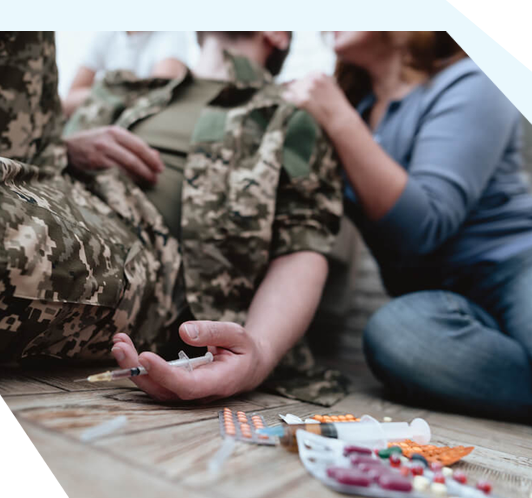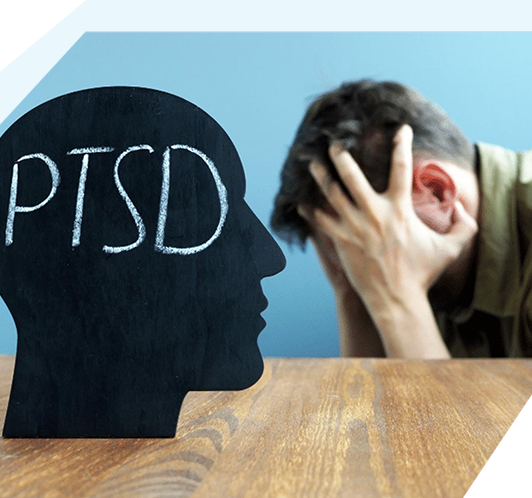Alcohol Treatment Programs
For Military Veterans
The stresses of military culture expose active service members to a lot of unique risks. Their time in the military can put them at greater risk of developing drug or alcohol addiction, for example. Here we will talk about the connection between substance abuse and military service.
Deployment is oftentimes associated with things like unhealthy drinking habits, smoke inhalation, and drug use. This is why some veterans actually develop drug addiction or alcohol addiction later in life.
Sadly, the existing zero tolerance policies and mandatory random drug testing that are designed to prevent drug abuse can also add to the stigma surrounding addiction.LEARN MORE
Substance Abuse
among Veterans
Substance abuse is a very common problem among veterans. This is due to the unique and dangerous situations they experienced during their time in the military.
Around 25% of soldiers who served in Afghanistan and Iraq were diagnosed with depression, LEARN MORE


Alcohol and Drug Abuse
Effects for Veterans
After leaving the military, most veterans take some time to readjust to their regular life. They need time to reintegrate into their old lifestyle, get reacquainted with friends and family members, and go back to living in their community. This, however, is easier said than done. LEARN MORE
What is Post-Traumatic
Stress Disorder?
Post-traumatic stress disorder is a very common problem for veterans, but what is it exactly? PTSD is a psychiatric disorder that typically occurs in people who have gone through or witnessed something traumatic. It can be a natural disaster, a terrorist act, a serious accident, sexual trauma, extreme violence, serious injury, or war. LEARN MORE


What is Military
Sexual Trauma?
According to VA, military sexual trauma or MST is sexual trauma, sexual harassment, or sexual assault that is experienced during military service. This includes any form of sexual activity during military service in which the person is involved against their will. LEARN MORE
Other Social and Mental
Health Issues Faced by
Veterans
On top of these conditions mentioned above, veterans face other challenges when it comes to their social life, their reputation, their mental health, their relationships, etc.
Veteran homelessness is a huge problem for a lot of former military personnel. There are roughly 40,000 former soldiers in the US who are homeless. LEARN MORE

How to Identify Substance Abuse in
Veterans
Identifying the signs and symptoms of alcohol abuse and drug abuse in veterans is the first step towards helping them recover. Doing your research is a good way to know more about addiction, alcohol abuse,
Alcohol Rehab for Veterans:
How Does it Work?
Once the veteran has accepted that they need help for their addiction, it’s time to choose a treatment program and facility. Knowing what to expect from rehab should help you with this decision.
There are many treatment options available such as inpatient and outpatient treatment programs. But it’s all a matter of choosing which one works best for your loved one. Ideally, you should find a treatment center that offers addiction treatment specifically designed for veterans. LEARN MORE
Alcoholism Among Veterans
Alcohol addiction among veterans is a pressing issue that requires specialized care and attention. Veterans often face unique challenges and experiences that can contribute to alcohol addiction. In this guide, we will explore the importance of alcohol rehab for veterans, focusing on the role of psychotherapy, the connection between alcohol addiction, PTSD, and depression, the medicines used in treating alcohol addiction, statistics highlighting the prevalence of alcohol addiction among veterans, and the various therapy types employed in the treatment process.
Psychotherapy in Alcohol Rehab for Veterans:
Psychotherapy, also known as talk therapy, is a cornerstone of alcohol rehab for veterans. It is a therapeutic approach that involves open and honest discussions with trained therapists to address the psychological and emotional aspects of alcohol addiction. Here are some key aspects of psychotherapy in alcohol rehab:
- Trauma-Informed Care: Veterans often carry the burden of traumatic experiences from their service. Psychotherapy aims to provide trauma-informed care, creating a safe environment for veterans to discuss and process their experiences.
- Cognitive-Behavioral Therapy (CBT): CBT is a common form of psychotherapy used in alcohol rehab. It helps veterans identify and change negative thought patterns and behaviors associated with alcohol addiction.
- Motivational Enhancement Therapy (MET): MET is a goal-oriented approach that helps veterans find and strengthen their motivation to overcome addiction. It focuses on setting achievable goals and building self-confidence.
PTSD, Depression, and Alcohol Addiction:
Post-Traumatic Stress Disorder (PTSD) and depression often co-occur with alcohol addiction among veterans. These conditions are interconnected, and addressing them is crucial for successful recovery:
- PTSD and Alcohol: Veterans with PTSD may turn to alcohol as a way to self-medicate and numb the emotional pain associated with trauma. Alcohol rehab programs must address both PTSD and alcohol addiction simultaneously.
- Depression and Alcohol: Depression can increase the risk of alcohol addiction, and alcohol can exacerbate symptoms of depression. Treating depression alongside alcohol addiction is vital for comprehensive care.
Medicines Used in Treating Alcohol Addiction:
Medications play a vital role in alcohol rehab for veterans. They can help manage cravings, reduce withdrawal symptoms, and support long-term recovery:
- Naltrexone: This medication reduces cravings for alcohol by blocking its euphoric effects. It is often used as part of a comprehensive treatment plan.
- Acamprosate: Acamprosate helps restore chemical imbalances in the brain caused by long-term alcohol use. It reduces withdrawal symptoms and cravings.
- Disulfiram: Disulfiram creates adverse reactions (nausea, vomiting) when alcohol is consumed, discouraging its use.
Statistics for Veterans Suffering from Alcohol Addiction:
Understanding the scope of alcohol addiction among veterans is crucial. Here are some key statistics:
- According to the Substance Abuse and Mental Health Services Administration (SAMHSA), approximately 11% of veterans aged 21 to 64 reported heavy alcohol use in the past month.
- The National Institute on Alcohol Abuse and Alcoholism (NIAAA) reports that veterans are more likely to drink heavily than civilians, with nearly 65% of veterans reporting alcohol use in the past year.
- Veterans with PTSD are at a higher risk of developing alcohol addiction. The U.S. Department of Veterans Affairs estimates that around 10% to 30% of veterans with PTSD have a co-occurring alcohol use disorder.
Therapy Types Used to Treat Alcohol Addiction:
In addition to psychotherapy, various therapy types are employed in alcohol rehab for veterans:
- Group Therapy: Group therapy sessions provide veterans with a supportive community of peers who understand their experiences. Sharing stories and coping strategies can be immensely therapeutic.
- Family Therapy: Involving family members in the treatment process can help repair relationships damaged by alcohol addiction and provide a strong support network for veterans.
- Holistic Therapies: Complementary therapies such as art therapy, music therapy, and yoga can help veterans manage stress, anxiety, and cravings.
- Mindfulness-Based Therapy: Mindfulness practices teach veterans to stay present, manage stress, and reduce impulsive behaviors that may lead to relapse.
Alcohol rehab for veterans is a vital and specialized field of addiction treatment that addresses the unique challenges faced by those who have served their country. By integrating psychotherapy, addressing co-occurring conditions like PTSD and depression, utilizing appropriate medications, and employing a variety of therapy types, alcohol rehab programs can offer comprehensive care to veterans on their journey to recovery. It is crucial to recognize the courage and sacrifice of veterans and provide them with the support and treatment they need to overcome alcohol addiction and lead healthier, fulfilling lives.
Services The VA (Veterans Affairs Office) Provides for Alcoholism Treatment for Military Veterans.
The U.S. Department of Veterans Affairs (VA) provides a range of services for alcoholism treatment for military veterans. These services are designed to address the unique needs and challenges that veterans face in overcoming alcohol addiction. Here are some of the key services and programs offered by the VA for alcoholism treatment:
- Substance Use Disorder (SUD) Treatment Programs: The VA operates specialized SUD treatment programs at VA medical centers and clinics across the country. These programs offer a variety of services, including outpatient, inpatient, and residential treatment options. Veterans can receive individualized care tailored to their specific needs.
- Detoxification Services: VA facilities provide detoxification services for veterans who need medically supervised withdrawal from alcohol. This can be an essential step in the recovery process, as withdrawal symptoms can be severe.
- Medication-Assisted Treatment (MAT): The VA offers MAT for veterans with alcohol use disorder (AUD). Medications such as naltrexone, acamprosate, and disulfiram may be prescribed to help manage cravings and support recovery.
- Counseling and Psychotherapy: Veterans can access individual and group counseling services to address the psychological and emotional aspects of alcohol addiction. Evidence-based therapies such as Cognitive-Behavioral Therapy (CBT) and Motivational Enhancement Therapy (MET) are commonly used.
- Dual Diagnosis Treatment: Many veterans with alcohol addiction also have co-occurring mental health conditions, such as PTSD, depression, or anxiety. The VA provides integrated treatment for dual diagnosis, addressing both substance use and mental health issues simultaneously.
- Outpatient Services: Outpatient treatment options allow veterans to receive care while living at home. These services may include regular counseling sessions, support groups, and access to medical professionals.
- Residential Rehabilitation Programs: For veterans who require a more intensive level of care, the VA offers residential rehabilitation programs where they can live on-site while receiving treatment. These programs provide a structured environment focused on recovery.
- Peer Support: The VA recognizes the importance of peer support in the recovery process. Veterans in recovery can connect with peers who have faced similar challenges, offering understanding and encouragement.
- Family Support: The VA involves family members in the treatment process whenever possible. Family therapy and education help veterans and their loved ones understand the impact of addiction and work toward healing relationships.
- Telehealth Services: To increase accessibility, the VA provides telehealth services for veterans seeking alcoholism treatment. Veterans can receive counseling and support remotely, which can be especially valuable for those in rural areas.
- Crisis Intervention: The VA has crisis intervention services available 24/7. Veterans in immediate distress or facing a crisis related to alcohol addiction can access help through the Veterans Crisis Line.
- Case Management: VA case managers work with veterans to develop personalized treatment plans, set goals, and connect them with the appropriate services and resources.
- Recovery Support Services: The VA offers ongoing support for veterans in recovery, including relapse prevention strategies, access to support groups, and assistance in maintaining sobriety.
It’s important to note that the specific services and programs available may vary from one VA facility to another. Veterans seeking alcoholism treatment should reach out to their local VA medical center or clinic to inquire about the services offered and to begin the process of seeking help for their addiction. The VA is committed to providing comprehensive care to veterans struggling with alcoholism to help them achieve and maintain sobriety.

